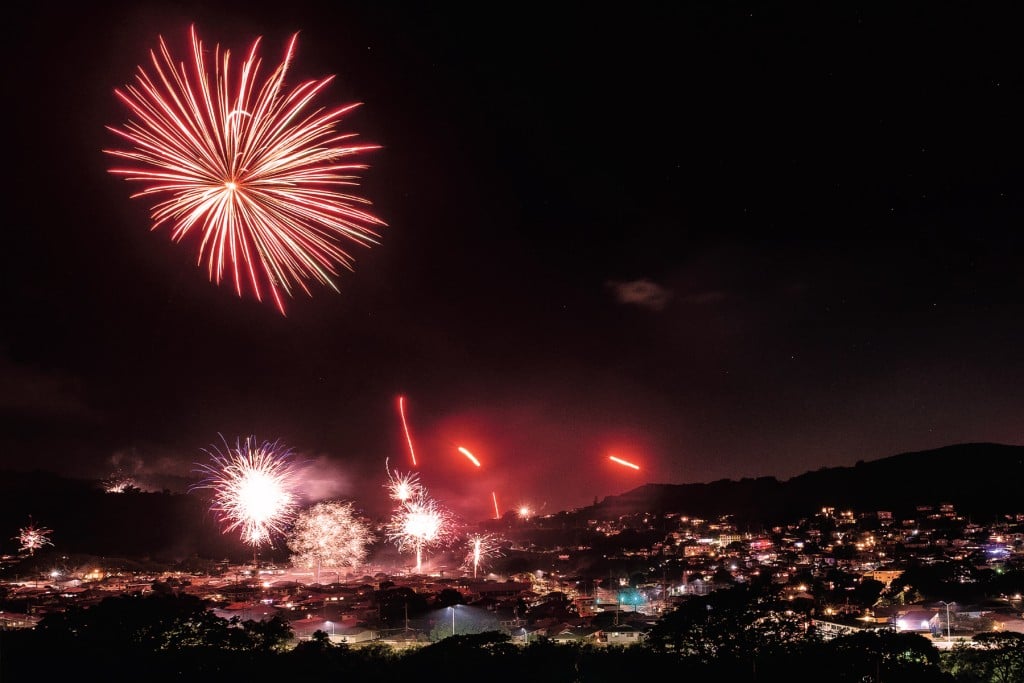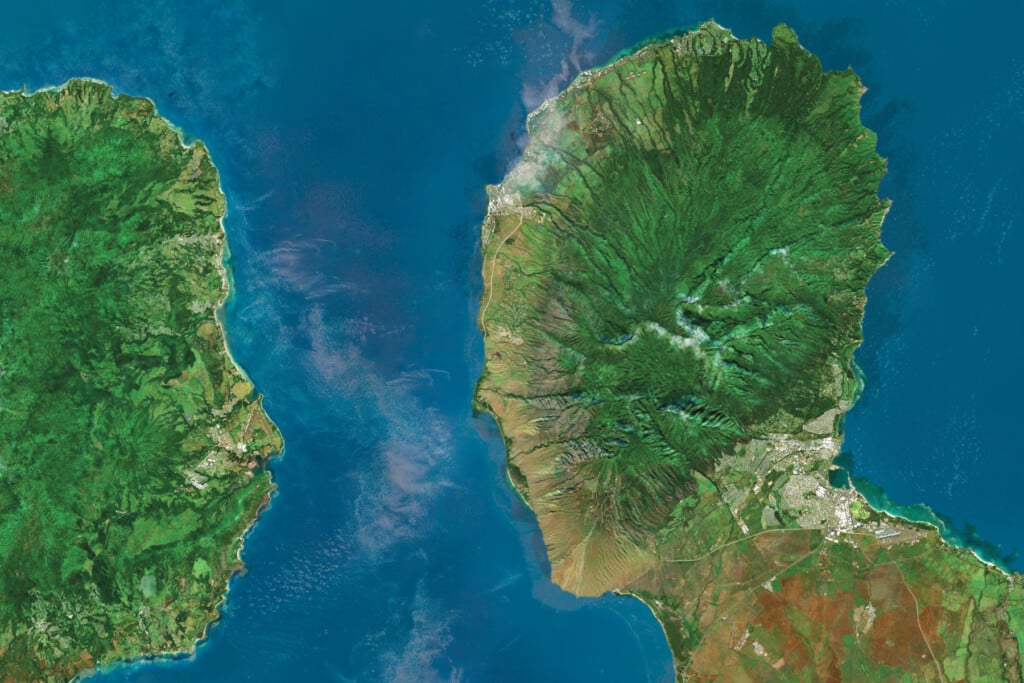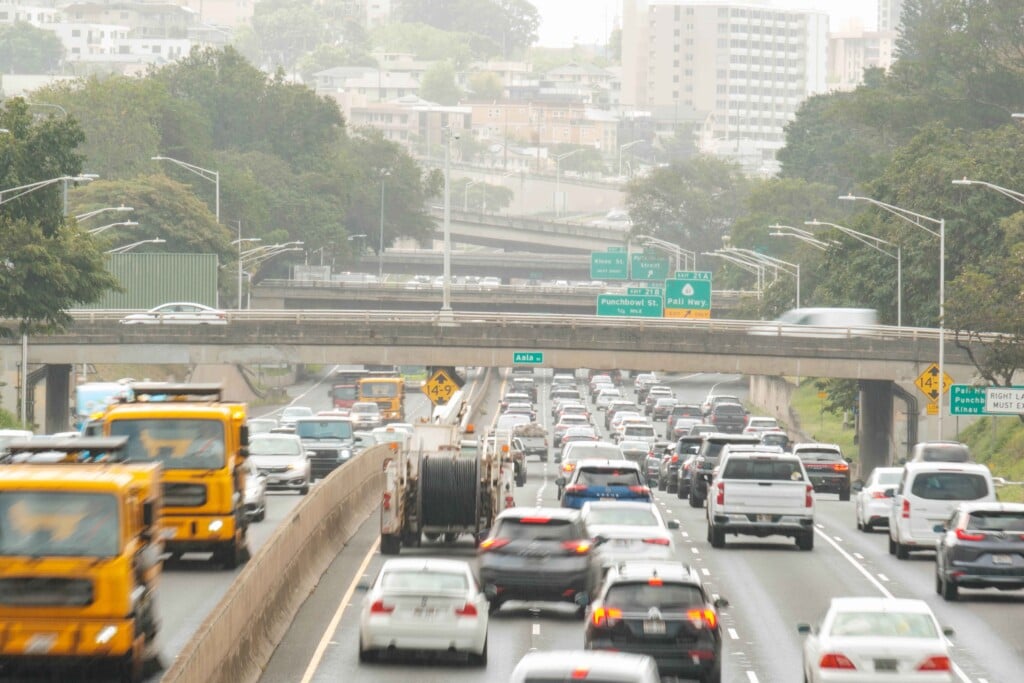Can We Stop Illegal Fireworks from Entering Hawai‘i?
Tens of thousands of fireworks are smuggled in each year. While random searches of shipping containers would help, it won’t be easy or cheap.

Although Hawai‘i has imposed strict laws such as banning most aerial fireworks and increasing fines up to $2,000 for violations, people still smuggle tens of thousands of illegal fireworks into the state each year.
Creighton Goldsmith, a retired U.S. Customs and Border Protection chief inspector in Honolulu, suspects most illegal fireworks arrive from the mainland, disguised inside shipping containers.
A 2011 report to the state Legislature from the Illegal Fireworks Task Force and a follow-up 2019 report both find that fireworks generally enter Hawai‘i inside shipping containers. The reports listed a series of challenges to stemming the flow, including the sheer volume of containers.
In the 2020 fiscal year, the equivalent of 1.54 million containers moved through Hawai‘i’s commercial harbors, which was actually down from about 1.6 million in each of the 2018 and 2019 fiscal years. The annual figures are based on 20-foot equivalent units, even though the containers themselves vary in size.
The 2011 report recommended using data collected from shipping companies, freight companies, and various state, county, and federal entities to pinpoint the location of risky cargo loads so they can be screened. This is called “targeting,” Goldsmith says.
That report also proposed conducting inspections after recipients pick up their shipments from the harbor, to avoid congestion.
“They don’t have time. They don’t care.”
Goldsmith worked with legislators and other officials on the 2011 task force to identify ways to find and seize illegal fireworks. He sums up why state and county officials have not cracked down: “They don’t have time. They don’t care.”
Over the years, lawmakers have introduced bills that would establish a shipping container inspection program and use explosive-sniffing dogs to detect fireworks.
Initially, shipping companies resisted the idea of an inspection program, according to Sen. Karl Rhoads, who introduced another fireworks bill this year that died at the state Legislature.
Matson says it is not opposed to inspections but wants them conducted away from the ports to avoid interference with its operations. Any additional inspections that takes place in its terminals “could cause significant delays in offloading and out-gating our cargo,” the company says.
Rhoads agrees that establishing an inspection program would be complicated and says “there are other avenues of attacking the problem that are probably necessary to really get a handle on it.” He referred to bills his colleagues introduced that would have a lower-level fireworks penalty that could be adjudicated like a traffic ticket. He says this would make it easier to prosecute violators and increase fines.
Goldsmith says agents of the U.S. Customs and Border Protection possess the skills and equipment to detect dangerous objects in containers, but they are prohibited from examining containers being shipped from one U.S. port to another. It can only search shipments from foreign locations.
But the skills to find illegal fireworks in containers can be taught to county fire officials and others he says, adding that the “targeting” system is effective.
He describes one instance where his targeting team tracked a shipment sent to Maui from Singapore. It was classified as furniture but the team “saw something interesting,” Goldsmith says.
It turned out the shipment included documents destined for an engineer on Maui who had worked on the B-2 stealth bomber and was selling secrets to the Chinese government and others. Noshir Gowadia was convicted of 14 charges and sentenced in 2011 to 32 years in prison.
Lack of manpower
The 2019 fireworks report said most domestic cargo can’t be searched without probable cause – the legal term describing the basis for a search warrant.
The Hawai‘i Department of Agriculture is the only state agency that currently can search domestic cargo, but its inspections are usually limited to looking for pests, according to the 2019 report.
Inspection programs and technology to hunt for illegal fireworks would delay shipments and require costly storage facilities to hold any seized explosives, the 2011 report said. Any suspected explosives or illegal fireworks would have to be stored as evidence in a trial.
Without detection technology, searches are generally limited to visual inspections, accidental discoveries in broken containers and discrepancies in shipping information. Using explosives-sniffing dogs to detect illegal fireworks would cost $70,000 to $80,000 per year, according to the Legislative Reference Bureau. That money would be used to train and maintain each dog and pay a full-time handler.
Injuries increasing again
The fireworks bans that took effect in 2011 had been credited with reducing injuries in Hawai‘i for a while, but now injuries are back on the rise.
From Dec. 31, 2020, to Jan. 2, 2021, 64 people were treated at emergency rooms statewide for fireworks-related injuries, according to the EMS & Injury Prevention System Branch of the state’s Department of Health. That’s the most since 2010-11 when the state reported 91 injuries.
Cris Bartolome, a Honolulu Fire Department captain, warns that people should not take firecrackers apart or mix them; doing so, he says, can result in third-degree burns and other severe injuries. He says that 40% to 44% of fire-works-related injuries are to the hands.
This past New Year’s Eve, HFD responded to a house fire that started when aerial fireworks ignited patio furniture.
Fireworks Injuries
After Hawai‘i imposed stricter fireworks laws in 2011, fireworks-related injuries dropped significantly during the state’s two biggest days for illegal fireworks: New Year’s Eve and New Year’s Day. But on Dec. 31, 2020, and Jan. 1, 2021, the state reported 64 injuries – the highest total since 2010-11. The worst two-day total was in 2009-10, before the stricter laws took effect.
Source: EMS and Injury Prevention System Branch, Hawai‘i Department of Health
A tradition that’s hard to break
The Honolulu Police Department says New Year’s has historically been busy, so it is difficult to catch everyone lighting illegal fireworks and to track down those with no permits.
There’s a permit that allows people to set off aerial fireworks – it costs $110 – but getting one is a long and complicated process. Those who want one must indicate where and when the fireworks will be set off, who will be setting off the fireworks and if that person is a “licensed pyrotechnic operator,” and have a written certificate from an insurance carrier.
From Nov. 28, 2021, to Jan. 8, 2022, there were 3,750 fireworks-related calls to 911, 52 citations issued, and four arrests made, according to HPD.
If residents want to report someone lighting illegal fireworks, HPD says they need to document it and provide a statement. Those caught could face fines of up to $2,000.
Rhoads, who lives in Chinatown and represents a district that also includes Downtown, Liliha and Nu‘uanu, says the problem has become worse in recent years and enforcement has been weak.
“Back when we banned aerials, it never went away completely but there were a couple of years where it wasn’t too bad,” he says. “And then the last two or three, it’s just unbelievable.”
Says Bartolome: “It’s hard because in Hawai‘i – the culture, mentality – it’s hard for people’s habits to break.”
Brought to neighbor islands
Hawaii Business Magazine used its social media platforms to ask residents how they got their illegal fireworks. No one was willing to talk on the record for fear they might be prosecuted or face retaliation. Hawaii Business rarely uses anonymous sources but felt the stories of two people were important additions to our on-the-record sources.
One person living on Hawai‘i Island admits to spending about $2,500 a year on illegal fireworks such as rockets and multishot fireworks called cakes. The resident buys them from a friend who receives them in shipments that arrive by ship.
A Maui resident says she has seen illegal fireworks arrive on the island in shipping containers. She says one of her friends is a business owner who frequently ships products from the mainland. This business owner was approached by a mutual friend “who asked if they could load something into their next container that’s coming to Maui.”
She says the business owner did not know initially that illegal fireworks had been added to the shipment; despite that, the business owner has allowed further illegal shipments for someone else, our source says.
Self-made pyrotechnics
The Makiki Neighborhood Board has strongly criticized the prevalence of illegal fireworks.
Samuel Mitchell, a board member who says he was involved in manufacturing explosives when he was younger, says that it is easy to order and receive materials through the mail to create your own illegal fireworks.
He says another board member who had worked for the U.S. Postal Service confirms that these “fireworks-making kits” can be shipped if packed separately.
“If it’s not mixed and it’s just a combination of materials, it’s not explosive,” he says, and can be shipped through the mail.
He referred to a 2020 case in which a Honolulu man was charged with possession of a chemical weapon and an unregistered destructive device. Ethan Sandomire allegedly ordered materials to make “a destructive device” from different online vendors, which were then delivered to his home, according to the U.S. Department of Justice.
The illegal making of fireworks is an issue that officials need to be aware about, says Mitchell, who spearheaded a Makiki board resolution that recommends officials make Hawai‘i a “safe and sane fireworks state.”
The number of fireworks going off between October and January has become a nuisance because it’s not just on one special day, he says.
Rhoads acknowledges that the bills he and some of his colleagues introduce may not get rid of all illegal fireworks, “but we could certainly curb it quite a lot from where it is.”
Tips For Handling Fireworks
- Be a responsible adult and use common sense.
- Do not use fireworks if you have been drinking.
- Do not hang fireworks on utility poles or lines. If you hang them on a stick, keep the stick at least 10 feet from utility poles and wires.
- Always have water or a fire extinguisher handy.
- If you are burned or otherwise injured by fireworks, cool the burn down with cool water for 20 minutes and cover with a dry, non-stick, sterile bandage.
Source: Honolulu Fire Department







